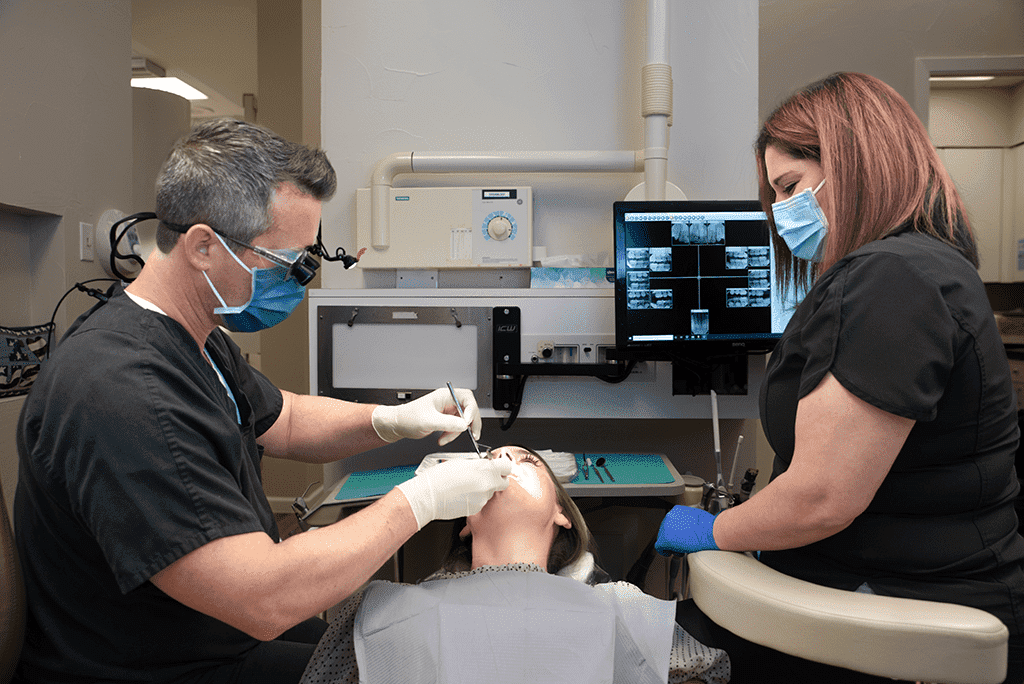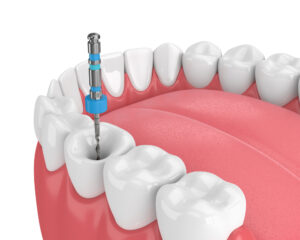Root Canal in Plano, TX
Dental health goes beyond cleanings and fillings, sometimes addressing deeper issues that underlie our teeth. One such procedure that tackles such problems head-on is a root canal. At Thomas Simmons DDS, your trusted dentist in Plano, TX, we ensure that undergoing a root canal is a comfortable and smooth experience. Dive into our comprehensive guide on root canal therapy, understanding the why, how, and what of this common procedure.

Protect Your Smile
Save Your Natural Teeth
At the heart of every tooth lies the pulp, a collection of nerves and blood vessels. Sometimes, due to decay or injury, this pulp can become infected. When this happens, a root canal becomes imperative to save the tooth.
The process involves removing the inflamed or infected pulp, cleaning and disinfecting the inside of the tooth, and then filling and sealing it. Contrary to popular belief, with modern dentistry and a skilled Plano dentist like Dr. Thomas Simmons, the procedure is no more uncomfortable than getting a filling.
When Is It Time For A Root Canal?
Severe toothache pain upon chewing or application of pressure
Prolonged sensitivity or pain to hot or cold temperatures
Darkening or discoloration of the tooth
Swelling and tenderness in nearby gums
A persistent or recurring lesion on the gums
What Is a Root Canal, Exactly?
If you’ve ever wondered about the name “root canal”, it’s directly linked to the part of the tooth that’s treated. Every tooth has a canal that houses its nerve and pulp (soft tissue filled with blood vessels and cells). This space runs right down to the tooth’s roots. When this pulp becomes infected or damaged, a root canal procedure is needed.

Why Opt for a Root Canal in Plano, TX?
- Preservation of Natural Teeth: The primary aim of a root canal is to save a tooth that might otherwise need to be extracted. Retaining your natural tooth is beneficial for efficient chewing, maintaining a natural appearance, and protecting other teeth from excessive wear or strain.
- High Success Rate: With advancements in dental technology, root canals boast a high success rate. When combined with a proper crown or filling and good oral hygiene, a tooth undergoing a root canal can last a lifetime.
- Cost-effective and Efficient: In the long run, saving your natural tooth through a root canal can be less expensive than alternatives, like bridges, implants, or dentures. Plus, these alternatives would require more treatment sessions and follow-up appointments.
- Modern Comfort: Say goodbye to the age-old horror stories of root canals. With Dr. Simmons at the helm, the procedure is as smooth as possible, with minimal discomfort. Our office utilizes state-of-the-art equipment and techniques to ensure you’re at ease throughout.
Benefits of a Root Canal Over Extraction
While it may seem easier to simply remove a troublesome tooth, there are numerous advantages to saving it with a root canal:
- Functionality: Natural teeth allow for more efficient chewing, ensuring you get the most from your food.
- Aesthetics: Keeping your natural tooth maintains the natural appearance of your smile.
- Speech: Some teeth play a crucial role in speech, and losing them can affect pronunciation.
- Jawbone health: An empty space after extraction can lead to bone loss over time.
The Root Canal Procedure: Step by Step
When you step into our clinic for a root canal in Plano, TX, here’s what you can expect:
- X-Ray: Dr. Simmons will take an X-ray to see the shape of the root canals and determine if there are any signs of infection in the surrounding bone.
- Anesthesia: The area around the affected tooth will be numbed using a local anesthetic. While root canals have a reputation, you’ll be surprised by how painless the procedure is, especially with numbing.
- Tooth Isolation: A rubber dam will be placed around the tooth to keep it dry and free of saliva during the procedure.
- Access Opening: An opening is made on the top of the tooth to access the infected or damaged pulp.
- Cleaning: The damaged pulp is removed, and the inside of the tooth is cleaned and disinfected thoroughly.
- Sealing: Post cleaning, the tooth’s interior is sealed. While some teeth might be sealed immediately, others might require a week’s wait, especially if there’s an infection and medication has been placed inside the tooth.
- Restoration: After sealing, the final step is restoration. The tooth is restored with a crown or filling for protection. Once restored, the tooth functions like any other tooth.
Post-Procedure Care and Recovery
After your root canal, it’s normal to experience some discomfort or mild pain. However, with over-the-counter painkillers, it’s easily manageable. Most patients can return to their regular activities the next day.
Maintaining good oral hygiene, including brushing, flossing, and regular check-ups, will ensure the longevity of your root-canal-treated tooth.
Cost and Insurance Considerations
One common concern many have is the cost associated with root canals. Here’s what you should know:
- Insurance: Many dental insurance plans cover part of the cost of root canals. It’s essential to consult with your provider.
- Payment Plans: At Thomas Simmons DDS, we understand that dental procedures can be hefty investments. Talk to our office about potential payment plans or financial arrangements.
- Comparative Costs: While the initial cost of a root canal may seem high, when compared to the long-term costs and potential complications of alternatives like extraction and replacement, it’s often the more cost-effective option.
FAQs About Root Canals
Are root canals painful?
Modern techniques and anesthesia have made root canals relatively painless procedures. Most discomfort comes from the infection itself, not the treatment.
How long does the procedure take?
Typically, one or two sessions of about 90 minutes each, but this can vary depending on the tooth and the extent of the infection or damage.
Can all teeth undergo a root canal?
Most teeth can undergo a root canal. However, if the damage or infection is too severe, or the tooth can’t be restored, extraction might be the only option.
Preserve Your Smile with a Root Canal in Plano, TX
When it comes to intricate procedures like root canals, trust is paramount. Dr. Simmons, with his extensive experience and patient-centric approach, ensures that you’re in safe hands. If you’re experiencing dental discomfort or just wish to have a comprehensive dental check-up, don’t hesitate to schedule your appointment.
GET STARTED
Ask About Our New Patient Special

Call Us
972-398-6002
Office
6861 Coit Rd. Ste A, Plano, TX 75024
Monday
7:15am – 5:00pm
Tuesday
7:15am – 6:00pm
Wednesday
Closed
Thursday
7:15am – 6:00pm
Friday
7:15am – 2:00pm
Saturday
By Appointment
